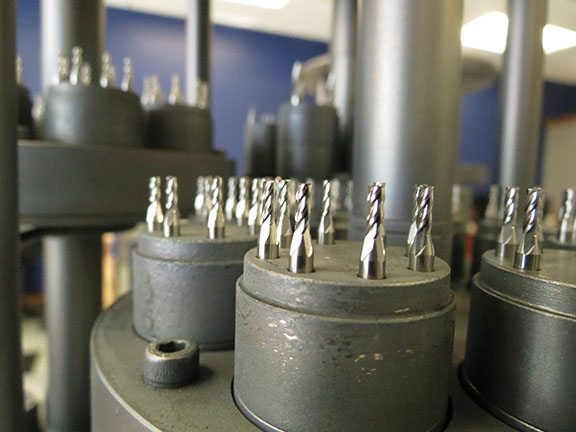2 min read
Process improvement tasks and objectives
There are many reasons why a company may pursue continuous improvement projects: teams may be tasked with identifying...

Adding coating to cutting tools is very common within the machining industry. Select the right coating and you can easily improve tool life and performance. It’s a cost-effective way to customize your tool to match both the material you’re working with and the operation you’re performing. The right coating can increase tool strength, lubricity for removing chips, and resistance to heat.
Below is an overview of some of the most common coating options and their properties. If you want to consult with experts in this area, reach out to MITGI and we will be happy to help you select the right coating for your application.
AlTiN (aluminum titanium nitride) is a widely popular choice for tool coating. It has high heat resistance properties so it is well-suited for hard machining applications like drilling. It is a good coating option if you are working with hardened steel, alloy steel, low carbon steel, carbon steel, martensitic stainless steel, PH stainless steel, and titanium. AlTiN may help you achieve longer tool life, especially in high speed applications.
MITGI offers several in-house coating options and since AlTiN is so popular most orders for tools coated in it have a lead time of just a day or two.
nACo is an AlTiN based nanocomposite that stands up well to hard material machining, and high heat. It’s a good choice for working with steels, hardened steels, stainless steels, and other super alloys. Many customers find they can improve their material removal rates with cutting tools coated with nACo.
nACRo is an aluminum chrome nitride nanocomposite with silicon nitride added in. It is a step up from nACo in terms of its durability. It works well for non-ferrous, standard steel, and super alloys. It’s heat and scratch resistant and very good at extending tool life.
TiN (titanium nitride) is a good universal coating for working with ferrous materials like iron, steel, alloy steel, and low carbon steel. It can reduce overall tool wear.
TiCN (titanium carbon-nitride) coating works well on non-ferrous materials, including aluminum. It can be used in some steel cutting applications. It is slightly harder than TiN and offers better lubricity because of its lower coefficient of friction. TiCN is good for milling and tapping cuts or any time a tool has particularly sharp edges or corners.
In general, you want to select a coating that does not include the material you’re cutting in its chemical composition. Many metals have an affinity for themselves so your performance could suffer if part of your tool matches your material.
Coating is a good first place to start when you’re trying to improve your tool performance or your tool costs. However, you don’t have to go back to school or dust off your old material sciences notebooks to achieve results.
MITGI is dedicated to helping customers reach their machining goals; it’s part of why we decided to install coating capabilities in our facility. If you know exactly what tool you want and what coating you prefer, fill out a quote sheet and we will send you a quote with pricing and lead time.
The MITGI technical and strategic teams may be able to help you find ways to dramatically improve your performance long term. Contact us to start the conversation.
Aug 20, 2025by MITGI
There are many reasons why a company may pursue continuous improvement projects: teams may be tasked with identifying...
Aug 13, 2025by MITGI
In many industries that require precision machining, burrs left behind during manufacturing can get in the way of the...
Mar 31, 2025by MITGI
For long-running product lines with well-established cutting tool usage, blanket orders are an easy way to ensure that...